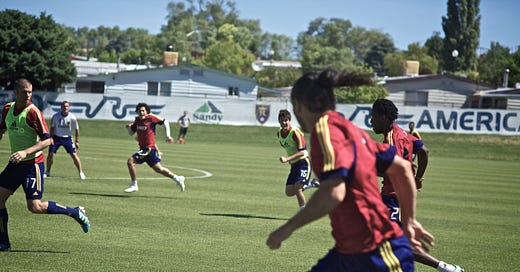Issue 22: Four things soccer taught me about board games
A look at soccer from a board games perspective, and vice versa.
Hello, all! I'm sitting, writing this on my couch as I finish watching Sunday morning's Arsenal match, half-vaccinated, and with the plum tree in the front yard just starting to bud. So it's all a good sign, even if it did dump a bit of snow on us this morning.
This week, I thought I'd take a look at some of the things I've learned as a soccer fan. If you've ended up here from outside my normal circle (and if so, welcome! I'm glad you're here.), you should know that for the last eight nine years or so, I've managed a site about our local soccer club, Real Salt Lake, RSL Soapbox.
First, some groundwork: As soccer is a game, I think we can learn something about board games, and certainly, board games can teach us something about soccer. I also don't think it's important here to distinguish between competitive and cooperative games, but I suppose all games must be done with an end in mind to really provide a meaningful comparison. Maybe all games must have an end in mind, but I'm not here to debate the meaning of the word "game."
The importance of granularity in considering score
"It's a low-scoring game" is not an uncommon complaint about soccer, but I think it's a weird complaint about any game. I believe it was in an episode of Ludology that I was introduced to the idea of scoring granularity, a concept that was pretty intuitive.
Granularity is an important consideration in game design; some games have high-granularity scores — think basketball, where you'll rack up a number of points but still may experience a close finish — and some have low-granularity scores — think soccer, where the final score is low, and the game is punctuated by brief moments in which one side scores. Of course, there are plenty of other methods of design that don't involve scoring at all, or that involve scoring as a 'race' to reaching a set number of points. Some games involve both a race of points and a non-scoring objective in conjunction, like Root.
In considering games, soccer illustrates one direction designers can go with scoring and measuring player performance. Understanding soccer's relation to other sports has helped me understand board game design more acutely.
The harmonious working of each individual part
Games in which players construct a system — most engine-building games, for example — often demand that systems are well-balanced and aren't being forced to carry dead weight. The same is true in soccer: A system is only as good as its weakest link, and your ability to win in competition will, at least in part, depend on your system being well-tuned and well-balanced.
There are, of course, other circumstances, wherein your system just have to do enough to get by.
Sometimes, it just takes one top-level piece to achieve victory
It is occasionally the case that I've loved a team that is generally OK but can elevate itself to a much higher level with just one key player. I'm reminded of Javier Morales's ankle injury in 2011, which I can't quite believe was nearly a decade ago. During his long absence from the team, they never quite figured out how to win reliably without him. He returned to some form the following year, and things looked considerably better. He was just one player — a cog in the system — but he took the team from merely OK to very good and a title-contender.
There are plenty of times in games that one card or ability might elevate your game from middling to very good. Even when games are perfectly balanced, accessing a key attribute before your opponent can be game-changing.
Not everything translates to a board game
I have long said that I would love to play a game based on my favorite sport, but the more I play and the more I watch, the more I don't think it's entirely feasible — at least, I haven't seen anything that makes me think you can replicate the physical action of the game.
While I think you can get some of the basic mechanics of soccer in a game — passing, shooting, tackling, possession, goalkeeping, and so much more — the joy of soccer is in the constant action punctuated by goals (or, in the case of a goalless draw, no goals, I guess.) The flow of action is quick, and it's relentless. Even if you were to turn soccer into a real-time board game, you'd lack some of the essential spirit of the game, wherein decisions are particularly open-ended.
Still, you might be able to turn some parts of the sport into a board game. Would you play a two-player penalty shootout game? I would.





